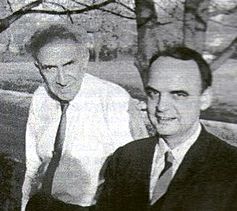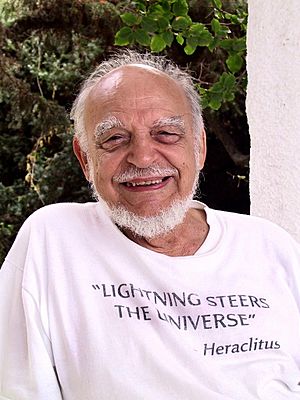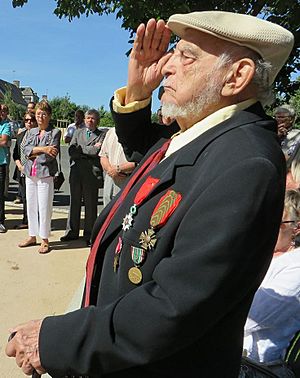Alfred de Grazia facts for kids
Alfred de Grazia (December 29, 1919 – July 13, 2014) was an American author and political scientist. He was born in Chicago, Illinois. He created new ways to study how people connect and interact using computers in the 1950s. He also developed ideas about keeping personal digital records in the 1970s. De Grazia was also known for supporting the catastrophism idea of Immanuel Velikovsky. This idea suggests that big, sudden events, like comets hitting Earth, shaped our planet's history.
Contents
His Family and Early Life
Alfred de Grazia's father, Joseph Alfred de Grazia, came from Sicily, Italy. He moved to the United States when he was twenty. He became a bandleader and music teacher in Chicago. In 1916, he married Katherine Lupo Cardinale, whose parents also came from Sicily.
Alfred had three younger brothers who became very successful:
- Sebastian de Grazia won a famous writing award called the Pulitzer Prize.
- Edward de Grazia was a well-known lawyer who defended people's rights to free speech. He also helped start a law school.
- Victor de Grazia was a high-ranking official in the government of Illinois from 1973 to 1977.
His Education
Alfred de Grazia went to the University of Chicago, where he earned his first degree in 1939. He also studied law at Columbia University for a year. In 1948, he earned a high-level university degree called a Ph.D. in political science from the University of Chicago.
His Ph.D. paper was published as a book in 1951, called Public and Republic: Political Representation in America. This book was about how people's voices are heard in government. The New York Times praised it as a "thorough examination" of this important topic.
His Time in the Military
During World War II, Alfred de Grazia served in the United States Army. He started as a private and rose to the rank of captain. He focused on fighting with machines like tanks and on psychological warfare. This new field involved using ideas and information to influence people during war. He trained in Washington D.C. and Camp Ritchie in Maryland.
He served with several armies and helped connect with the British 8th Army. He took part in six major campaigns, from North Africa to Italy (including the Battle of Monte Cassino), France, and Germany.
De Grazia helped write a report on psychological warfare for the main command center of the Allied forces in Europe. By the end of the war, he was in charge of a special team that used propaganda for the 7th Army. He also wrote many letters to his fiancée, Jill Oppenheim, during the war. These letters were later published online as "Letters of Love and War."
After World War II, de Grazia wrote guides on psychological warfare for the CIA for the Korean War. He also looked into psychological operations for the United States Department of Defense during the Vietnam War. His reports, which are now mostly public, include Psychological Operations in Vietnam (1968). In 2014, after he passed away, he received a special honor for his work in psychological operations at Fort Bragg, North Carolina.
For his service in World War II, de Grazia received several awards:
- The Bronze Star from the U.S.
- The EAME Campaign Medal from the U.S.
- The Croix de Guerre from France.
- In 2013, he received France's highest honor, becoming a Chevalier of the Legion of Honor.
- He also received the Robert A. McClure Medal for his excellent service in psychological operations.
His Career as a Professor
From 1948 to 1950, Alfred de Grazia was a professor of political science at the University of Minnesota. Then he joined Brown University. In 1952, he became the director of a research committee at Stanford University, supported by a grant from the Ford Foundation. He wrote a textbook called The Elements of Political Science (1952), which was praised for its clear explanation of politics.
In 1955, he did not get a permanent job at Stanford after studying how workers get involved in politics. He left Stanford in 1957. From 1959 to 1983, he was a permanent professor at New York University, teaching about government and social ideas.
In 1957, de Grazia started a journal called PROD: Political Research: Organization and Design. This journal was seen as a leading voice for new ideas in political studies. It was later renamed The American Behavioral Scientist and focused on how people behave in society. In 1965, he created the Universal Reference System, which was the first computer system to organize research in the social sciences.
He also wrote books for the American Enterprise Institute, including Congress and the Presidency: their Role in Modern Times. In this book, he debated with Arthur M. Schlesinger Jr. about whether the President or Congress should have more power.
Supporting Velikovsky's Ideas

Alfred de Grazia became very interested in Immanuel Velikovsky's ideas about catastrophism. Velikovsky believed that major disasters caused by events in space had shaped Earth's history. Many scientists did not agree with Velikovsky's claims.
De Grazia dedicated a whole issue of his journal, American Behavioral Scientist, to Velikovsky's ideas in 1963. He also published two of his own books on the topic: The Velikovsky Affair: The Warfare of Science and Scientism and Cosmic Heretics.
Some people believe that de Grazia's efforts helped keep Velikovsky's ideas known. In his books, de Grazia argued that the way scientists reacted to Velikovsky showed problems within the scientific community.
De Grazia supported Velikovsky's main idea that big, sudden events from space happened in the last 15,000 years. He believed these events had a huge impact on Earth and its living things. De Grazia called this idea "Quantavolution."
Later Career and Travels
In the early 1970s, de Grazia started the "University of the New World" in Haute-Nendaz, Switzerland. It was meant to be a different kind of university, less structured than American ones. He even invited the famous writer William S. Burroughs to teach there.
In 2002, de Grazia became a visiting professor at the University of Bergamo in Italy. He had also been a visiting lecturer at other universities around the world, including the University of Rome, the University of Bombay, the University of Istanbul, and the University of Gothenburg in Sweden.
His Personal Life
Alfred de Grazia was married three times. His first wife was Jill Oppenheim (who passed away in 1996), from 1942 to 1971. He then married Nina Mavridis from 1972 to 1973. From 1982 until his death, he was married to Anne-Marie (Ami) Hueber-de Grazia, a French writer.
He had seven children with Jill Oppenheim. One of his daughters, Victoria de Grazia, is a Professor of Contemporary History at Columbia University and a member of the American Academy of Arts and Sciences.
The many letters Alfred de Grazia and Jill Oppenheim wrote to each other during World War II were saved and published online.
Works
- Michels, Robert, First lectures in political sociology. Translated, with an introduction, by Alfred de Grazia. Minneapolis: University of Minnesota Press, [1949]. And Harper & Row, 1965.
- Public and republic: political representation in America. New York: Knopf, 1951.
- The elements of political science Vol 1: Political Behavior and Vol. 2: Political organization. Series: Borzoi Books in Political Science. New York: Knopf, 1952. And second revised edition: Politics and government: the elements of political science. [1962]. New York: Collier, 1962– ;new revised edition, New York: Free Press London: Collier Macmillan, 1965.
- The Western Public: 1952 and beyond. [A study of political behaviour in the western United States.]. Stanford: Stanford University Press, [1954.]
- The American way of government. National edition. New York : Wiley, [1957]. There is also a "National, State and Local edition".
- Foundation for Voluntary Welfare. Grass roots private welfare : winning essays of the 1956 national awards competition of the Foundation for Voluntary Welfare. Alfred de Grazia, editor. New York: New York University Press, 1957.
- American welfare. New York: New York University Press, 1961 (with Ted Gurr).
- World politics: a study in international relations. Series: College Outline Series. New York: Barnes & Noble, 1962.
- Apportionment and representative government. Series: Books that matter. New York : Praeger, c.1963
- Essay on apportionment and representative government. Washington : American Enterprise Institute, 1963
- Revolution in teaching: new theory, technology, and curricula. With an introduction by Jerome Bruner. New York: Bantam Books, [1964] (editor, with David A. Sohn).
- Universal Reference System. Political science, government, and public policy: an annotated and intensively indexed compilation of significant books, pamphlets, and articles, selected and processed by the Universal Reference System. Prepared under the direction of Alfred De Grazia, general editor, Carl E. Martinson, managing editor, and John B. Simeone, consultant. Princeton, N.J.: Princeton Research Pub. Co., 1965–69. Plus nine more volumes on the subjects of: International Affairs; Economic Regulation; Public Policy and the Management of Science; Administrative Management; Comparative Government and Cultures; Legislative Process; Bibliography of Bibliographies in Political Science, Government and Public Policy; Current Events and Problems of Modern Society; Public Opinion, Mass Behavior and Political Psychology; Law, Jurisprudence and Judicial Process.
- Republic in crisis: Congress against the executive force. New York: Federal Legal Publications, [1965]
- Political behavior. Series: Elements of political science; 1. New, revised edition. New York: Free press paperback, 1966.
- Congress, The First Branch of Government, editor, Doubleday – Anchor Books, 1967
- Congress and the Presidency: Their Roles in Modern Times, with Arthur M. Schlesinger, American Enterprise Institute for Public Policy Research, Washington, 1967.
- Passage of the Year, Poetry, Quiddity Press, Metron publications, Princeton, N.J., 1967.
- The Behavioral Sciences: Essays in honor of George A. Lundberg, editor, Behavioral Research Council, Great Barrington, Mass;, 1968.
- Kalos: What is to be Done with Our World?,, New York University Press, 1968.
- Old Government, New People: Readings for the New politics, et al., Scott, Foresman, Glenview, Ill., 1971.
- Politics for Better or Worse, Scott, Foresman, Glenview, Ill., 1973.
- Eight Branches of Government: American Government Today, w. Eric Weise, Collegiate Pub., 1975.
- Eight Bads – Eight Goods: The American Contradictions, Doubleday – Anchor Books, 1975.
- Supporting Art and Culture: 1001 Questions on Policy, Lieber-Atherton, New York, 1979.
- Kalotics: A Revolution of Scientists and Technologists for World Development, Kalos Foundation, Bombay, 1979.
- A Cloud Over Bhopal: Causes, Consequences, and Constructive Solutions, Kalos Foundation for the India-America Committee for the Bhopal Victims: Popular Prakashan, Bombay, 1985.
- The Babe, Child of Boom and Bust in Old Chicago, umbilicus mundi, Quiddity Press, Metron Publications, Princeton, N.J., 1992.
- The Student: at Chicago in Hutchin's Hey-day, Quiddity Press, Metron Publications, Princeton N.J., 1991.
- The Taste of War: Soldiering in World War II, Quiddity Press, Metron Publications, Princeton, N.J., 1992.
- Twentieth Century Fire-Sale, Poetry, Quiddity Press, Metron Publications, Princeton, N.J., 1996.
- The American State of Canaan – the peaceful, prosperous juncture of Israel and Palestine as the 51st State of the United States of America, Metron Publications, Princeton, NJ, 2009 LCCN 2008945276.
See Also
 | Janet Taylor Pickett |
 | Synthia Saint James |
 | Howardena Pindell |
 | Faith Ringgold |



